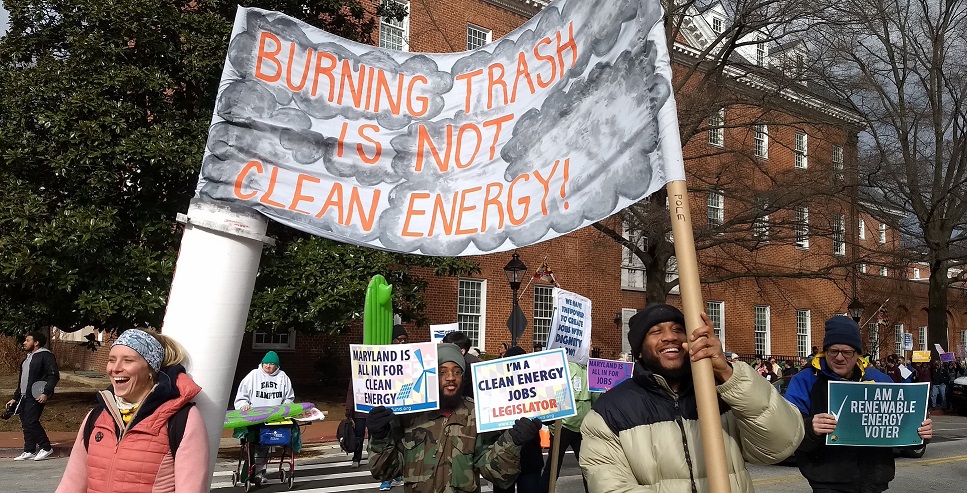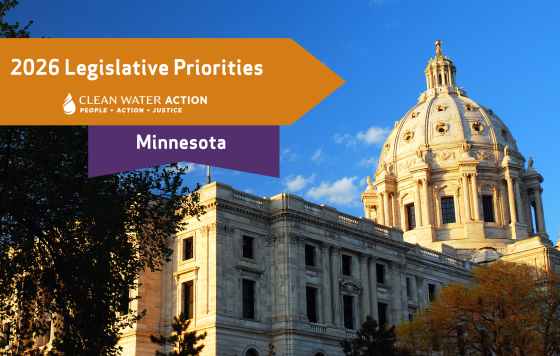
On 1/25, we spoke in front of the Senate Education, Energy, and the Environment Committee - and on 3/7, we're speaking in front of the House Economic Matters Committee say: burning trash is not clean energy! Maryland must pass the Reclaim Renewable Energy Act to stop wasting our renewable energy subsidies on trash incineration, and make tens of millions of dollars available for real renewable energy investment at no cost to the state budget. Read sign-on testimony from 81 organizations in support of the bill below, and click here to contact your representatives!
Testimony Supporting SB146
Senate Education, Energy, and the Environment Committee
January 25, 2024
Testimony Supporting HB166
House Economic Matters Committee
March 7, 2024
Position: SUPPORT
The undersigned 81 organizations 87 organizations (edit: 6 additional organizations signed on by the House hearing) urge you to pass the Reclaim Renewable Energy Act (SB146) to stop wasting Maryland residents’ money and make more funding available for real renewable energy - at no additional cost to the state budget. Trash incineration is neither clean nor renewable; its inclusion in the Renewable Portfolio Standard (RPS) is counter to the program’s goals. Maryland ratepayers would be better served if their funds currently subsidizing trash incineration were supporting real renewable energy instead. With both government and advocate support, 2024 is the year to eliminate trash incineration from the RPS.
The purpose of the RPS is to support clean, renewable energy, which Maryland needs now more than ever. When establishing the RPS in 2004, the legislature wrote that the benefits of renewable energy include “long-term decreased emissions'' and “a healthier environment.” Since 2004, the urgency of supporting renewable energy development in Maryland and throughout our grid has only become greater. Maryland must urgently act to reduce greenhouse gas emissions and carefully assess how we are spending the state’s resources to fight climate change, including the effectiveness of the Renewable Portfolio Standard program at delivering long-term decreased emissions and a healthier environment.
Maryland is wasting an increasing amount of RPS money on trash incineration, much of it out of state. Over three years, due to the market-based nature of the subsidy (the amount of electricity produced by incinerators has not increased), the total subsidies to trash incinerators through Maryland’s RPS ballooned from $11.5 million in 2020 to $24.7 million in 2022. In 2022, the BRESCO incinerator in Baltimore received $4.2 million; the Montgomery County incinerator in Dickerson received $8.7 million, and the Covanta incinerator in Lorton, VA, received a windfall of $11.7 million - twice as much as Montgomery County’s incinerator and three times as much as the incinerator in Baltimore. If these trends continue and trash incineration remains in the RPS, Maryland ratepayers will be increasingly harmed: we will be wasting ever-increasing amounts of money, much of it out of state, that isn’t putting renewable power on the grid.
Trash incineration is not clean, renewable energy and is contradictory to the goals of the RPS. Trash incineration is among the dirtiest methods of producing electricity. A new 2023 study in PLOS Climate found that “incinerators emit more greenhouse gas emissions per unit of electricity produced than any other power source” - even coal plants. EPA’s Emissions Inventory indicates that in 2020, the three trash incinerators profiting from Maryland’s RPS emitted 2.5 million tons of CO2 into the atmosphere. New emissions limits required at the BRESCO incinerator by a court settlement in 2020 do not include any requirement to decrease CO2 emissions and allow the incinerator to continue to emit mercury and lead, which are not safe for human exposure at any level. In its Final Report Concerning the Maryland Renewable Portfolio Standard, the Maryland Power Plant Research Program analyzed the emissions profile of the Renewable Portfolio Standard and found that “the Maryland RPS has resulted in modest greenhouse gas reductions but may be working at cross-purposes with the state’s efforts to reduce nitrogen oxides (NOx) and sulfur dioxide (SO2) emissions,” in part because of the inclusion of trash incineration. In the Reclaim Renewable Energy Act, the legislature has a choice between making millions of dollars available to support real renewable energy that delivers long-term decreased emissions and a healthier environment, or to support trash incineration. The choice is clear: Maryland should support energy sources that emit no CO2, mercury, or lead, instead of those that do.
Eliminating trash incineration from the RPS is a budget-neutral means of making more money available for renewable energy. Maryland needs to invest in climate solutions, and finding funding for the $1 billion per year called for in Maryland’s Climate Pollution Reduction Plan poses a significant challenge as the state budget contracts. Analyses consistently show that passing the Reclaim Renewable Energy Act is not associated with a financial cost to the state. Instead it will redistribute the subsidy Maryland ratepayers already pay that had been wasted profiting trash incinerators to support renewable energy sources that remain in the RPS.
This action is recommended in Maryland’s Climate Pollution Reduction Plan. In the plan released last month, the Maryland Department of the Environment recommends aligning the Renewable Portfolio Standard with the forthcoming Clean Power Standard. Although details of the Clean Power Standard are under development, one important detail is clear: the plan specifies that the Clean Power Standard will not include trash incineration (pages 21, 23). On page 90, the plan lists recommended legislative actions, including:
Legislative Action #2: Modify the Renewable Portfolio Standard - In consultation with MDE and MEA, pass legislation to modify the definitions of qualifying resources in the RPS to align with definitions of clean power resources under the forthcoming Clean Power Standard.
Likewise, the Maryland Commission on Climate Change’s 2023 Annual Report recommends:
Mitigation Working Group Recommendation #18: Due to the energy source’s contributions to the state’s GHG emissions, the General Assembly should adopt legislation to remove municipal solid waste incineration as an eligible generating source from the RPS.
Maryland governmental bodies, climate experts, renewable energy business, environmental and environmental justice advocates, and community organizations are united: burning trash is not clean energy, and Maryland must stop subsidizing it through the Renewable Portfolio Standard.
Sincerely,
Mid-Atlantic Justice Coalition
Clean Water Action
Chesapeake Climate Action Network
Food and Water Watch
Indivisible HoCoMD
Unitarian Universalist Legislative Ministry of Maryland
Progressive Maryland
Institute for Local Self-Reliance
Cedar Lane Unitarian Universalist Environmental Justice Ministry
Mountain Maryland Movement
Beaverdam Creek Watershed Watch Group
Montgomery Countryside Alliance
Centro de Apoyo Familiar
Chesapeake Physicians for Social Responsibility
CASA
Maryland PIRG
Environment Maryland
League of Women Voters of Maryland
Cleanwater Linganore Inc.
Climate Communications Coalition
Concerned Citizens Against Industrial CAFOS (CCAIC)
Waterkeepers Chesapeake
Sugarloaf Citizens Association
Environmental Integrity Project
Envision Frederick County
Glen Echo Heights Mobilization
Safe Healthy Playing Fields Inc
Friends of Sligo Creek
Elders Climate Action
Ask the Climate Question
South Baltimore Community Land Trust
Zero Waste Montgomery County
Howard County Climate Action
Fellowship of Scientists and Engineers
Sugarloaf Alliance
Maryland Legislative Coalition
Gwynns Falls Community Association
Maryland Legislative Coalition Climate Justice Wing
National Aquarium
Maryland Energy Advocates
Nuclear Information and Resource Service
The Climate Mobilization, Montgomery County chapter
Mobilize Frederick
Climate Law & Policy Project
Echotopia LLC
Baltimore Phil Berrigan Memorial Chapter Veterans For Peace
Compost Crew
Maryland Latinos Unidos (MLU)
Beyond Extreme Energy
350.org
Baltimore Transit Equity Coalition
Climate Reality Greater Maryland
Third Act Maryland
Casa de Restauracion Hispana Cristiana
Public Employees for Environmental Responsibility
Maryland Catholics for Our Common Home
Baltimore 350
Ebenezer Church of God
Milagros de Jesucristo Inc
Maryland Green Party
Blue Water Baltimore
Community Development Network of Maryland
Sentinels of Eastern Shore Health
The Center for Community Engagement, Environmental Justice, and Health (CEEJH)
1199SEIU United Healthcare Workers East
Green Sanctuary Committee of the Unitarian-Universalist Church of Silver Spring
Audubon Mid-Atlantic
Earthjustice
Baltimore Community ToolBank
Biodiversity for a Livable Climate
Sustainable Hyattsville
Climate Change Working Group of Frederick County
Potomac Riverkeeper Network
Gunpowder Riverkeeper
Neighborhood Sun
Maryland Ornithological Society
Iglesia Pentecostes Manantiales de Agua Vivia
Timothy Baptist Church
#CoalFreeCurtisBay
Emmanuel United Methodist Church, Laurel, MD
BWCUMC Creation Care Team
EDIT: Additional organizations that signed on for the Senate testimony,
Women's Democratic Club of Montgomery County
One Montgomery Green
UFCW Local 1994 MCGEO
Chesapeake Earth First!
Interfaith Partners for the Chesapeake
North Avenue and Hilton Street Business and Community Taskforce


